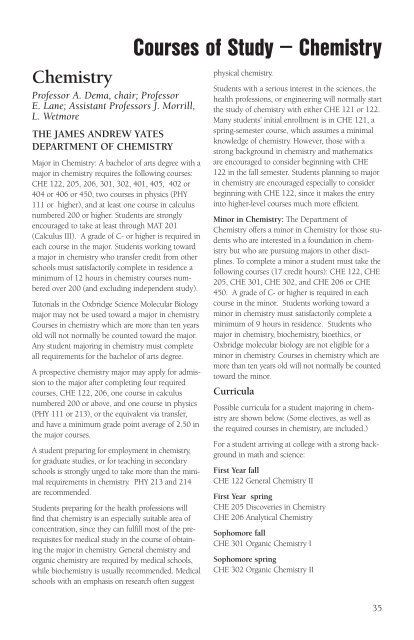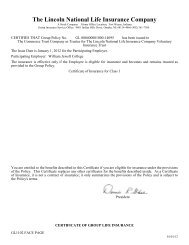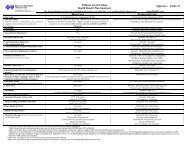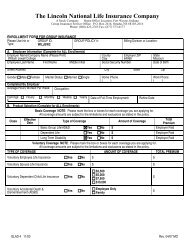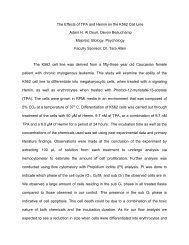Courses of Study - William Jewell College
Courses of Study - William Jewell College
Courses of Study - William Jewell College
You also want an ePaper? Increase the reach of your titles
YUMPU automatically turns print PDFs into web optimized ePapers that Google loves.
Chemistry<br />
Pr<strong>of</strong>essor A. Dema, chair; Pr<strong>of</strong>essor<br />
E. Lane; Assistant Pr<strong>of</strong>essors J. Morrill,<br />
L. Wetmore<br />
THE JAMES ANDREW YATES<br />
DEPARTMENT OF CHEMISTRY<br />
Major in Chemistry: A bachelor <strong>of</strong> arts degree with a<br />
major in chemistry requires the following courses:<br />
CHE 122, 205, 206, 301, 302, 401, 405, 402 or<br />
404 or 406 or 450, two courses in physics (PHY<br />
111 or higher), and at least one course in calculus<br />
numbered 200 or higher. Students are strongly<br />
encouraged to take at least through MAT 201<br />
(Calculus III). A grade <strong>of</strong> C- or higher is required in<br />
each course in the major. Students working toward<br />
a major in chemistry who transfer credit from other<br />
schools must satisfactorily complete in residence a<br />
minimum <strong>of</strong> 12 hours in chemistry courses numbered<br />
over 200 (and excluding independent study).<br />
Tutorials in the Oxbridge Science Molecular Biology<br />
major may not be used toward a major in chemistry.<br />
<strong>Courses</strong> in chemistry which are more than ten years<br />
old will not normally be counted toward the major.<br />
Any student majoring in chemistry must complete<br />
all requirements for the bachelor <strong>of</strong> arts degree.<br />
A prospective chemistry major may apply for admission<br />
to the major after completing four required<br />
courses, CHE 122, 206, one course in calculus<br />
numbered 200 or above, and one course in physics<br />
(PHY 111 or 213), or the equivalent via transfer,<br />
and have a minimum grade point average <strong>of</strong> 2.50 in<br />
the major courses.<br />
A student preparing for employment in chemistry,<br />
for graduate studies, or for teaching in secondary<br />
schools is strongly urged to take more than the minimal<br />
requirements in chemistry. PHY 213 and 214<br />
are recommended.<br />
Students preparing for the health pr<strong>of</strong>essions will<br />
find that chemistry is an especially suitable area <strong>of</strong><br />
concentration, since they can fulfill most <strong>of</strong> the prerequisites<br />
for medical study in the course <strong>of</strong> obtaining<br />
the major in chemistry. General chemistry and<br />
organic chemistry are required by medical schools,<br />
while biochemistry is usually recommended. Medical<br />
schools with an emphasis on research <strong>of</strong>ten suggest<br />
<strong>Courses</strong> <strong>of</strong> <strong>Study</strong> – Chemistry<br />
physical chemistry.<br />
Students with a serious interest in the sciences, the<br />
health pr<strong>of</strong>essions, or engineering will normally start<br />
the study <strong>of</strong> chemistry with either CHE 121 or 122.<br />
Many students’ initial enrollment is in CHE 121, a<br />
spring-semester course, which assumes a minimal<br />
knowledge <strong>of</strong> chemistry. However, those with a<br />
strong background in chemistry and mathematics<br />
are encouraged to consider beginning with CHE<br />
122 in the fall semester. Students planning to major<br />
in chemistry are encouraged especially to consider<br />
beginning with CHE 122, since it makes the entry<br />
into higher-level courses much more efficient.<br />
Minor in Chemistry: The Department <strong>of</strong><br />
Chemistry <strong>of</strong>fers a minor in Chemistry for those students<br />
who are interested in a foundation in chemistry<br />
but who are pursuing majors in other disciplines.<br />
To complete a minor a student must take the<br />
following courses (17 credit hours): CHE 122, CHE<br />
205, CHE 301, CHE 302, and CHE 206 or CHE<br />
450. A grade <strong>of</strong> C- or higher is required in each<br />
course in the minor. Students working toward a<br />
minor in chemistry must satisfactorily complete a<br />
minimum <strong>of</strong> 9 hours in residence. Students who<br />
major in chemistry, biochemistry, bioethics, or<br />
Oxbridge molecular biology are not eligible for a<br />
minor in chemistry. <strong>Courses</strong> in chemistry which are<br />
more than ten years old will not normally be counted<br />
toward the minor.<br />
Curricula<br />
Possible curricula for a student majoring in chemistry<br />
are shown below. (Some electives, as well as<br />
the required courses in chemistry, are included.)<br />
For a student arriving at college with a strong background<br />
in math and science:<br />
First Year fall<br />
CHE 122 General Chemistry II<br />
First Year spring<br />
CHE 205 Discoveries in Chemistry<br />
CHE 206 Analytical Chemistry<br />
Sophomore fall<br />
CHE 301 Organic Chemistry I<br />
Sophomore spring<br />
CHE 302 Organic Chemistry II<br />
35


